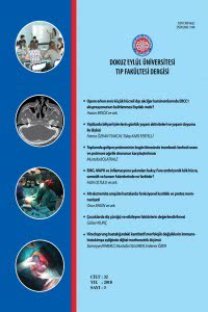Gebelerde Doğum Korkusu Prevalansı ve Risk Faktörleri: Kesitsel Bir Çalışma
tokofobi, prevelans, gebe, risk faktörü, doğum korkusu
Prevalence and Predictors of Fear of Childbirth in Unselected Pregnant Women: A Cross-Sectional Study
tokophobia, prevalence, pregnant, predictor, fear of childbirth,
___
- Demšar K, Svetina M, Verdenik I, Tul N, Blickstein I, Velikonja VG. Tokophobia (fear of childbirth): prevalence and risk factors. J Perinat Med.2018;46:151-54.
- Beiranvand SP, Moghadam ZB, Salsali M, Majd HA, Birjandi M, Khalesi ZB. Prevalence of fear of childbirth and its associated factors in primigravid women: A cross-sectional study. Shiraz E Med J. 2017;18.
- Phunyammalee M, Buayaem T, Boriboonhirunsarn D. Fear of childbirth and associated factors among low-risk pregnant women. J Obstet Gynaecol Res.2019;39:763-67.
- Calderani E, Giardinelli L, Scannerini S, Arcabasso S, Compagno E, Petraglia F, et al.Tocophobia in the DSM-5 era: Outcomes of a new cut-off analysis of the Wijma delivery expectancy/experience questionnaire based on clinical presentation. J Psychosom Res.2019;116:37-43.
- Ayers S. Fear of childbirth, postnatal post-traumatic stress disorder and midwifery care. Midwifery. 2014;30:145–48.
- Haines H, Pallant, JF, Karlström A, Hildingsson, I. Cross-cultural comparison of levels of childbirth-related fear in an Australian and Swedish sample. Midwifery. 2011;27:560-67.
- O'Connell MA, Leahy‐Warren P, Khashan AS, Kenny LC, O'Neill SM. Worldwide prevalence of tocophobia in pregnant women: systematic review and meta‐analysis. Acta Obstet Gynecol Scand. 2017;96:907-20.
- Lukasse M, Schei B, Ryding EL. Prevalence and associated factors of fear of childbirth in six European countries. Sex Reprod Healthc. 2014;5:99–106.
- Lowe NK. Self-efficacy for labor and childbirth fears in nulliparous pregnant women. J Psychosom Obstet Gynaecol. 2000;21:219–24.
- Spice K, Jones SL, Hadjistavropoulos HD, Kowalyk K, Stewart SH. Prenatal fear of childbirth and anxiety sensitivity. J Psychosom Obstet Gynaecol.2009;30:168-74.
- Matinnia N, Faisal I, Hanafiah Juni M, Herjar A, Moeini B, Osman Z. Fears related to pregnancy and childbirth among primigravidae who requested caesarean versus vaginal delivery in Iran. Matern Child Health J. 2015;19:1121–30.
- O'Connell MA, Leahy‐Warren P, Kenny LC, O'Neill SM, Khashan AS. The prevalence and risk factors of fear of childbirth among pregnant women: A cross‐sectional study in Ireland. Acta Obstet Gynecol Scand.2019;98:1014-23.
- Aksoy AN, Ozkan H, Gundogdu G. Fear of childbirth in women with normal pregnancy evolution. Clin Exp Obstet Gynecol. 2015;42:179–83.
- Çıtak Bilgin N, Coşkun H, Coşkuner Potur D, İbar Aydın E, Uca E. Psychosocial predictors of the fear of childbirth in Turkish pregnant women. J Psychosom Obstet Gynaecol.2020;1-9. doi: 10.1080/0167482X.2020.1734791.
- Kaya D, Evcili F. The affecting factors of childbirth fear for pregnant women admitted to a health center and university hospital in Turkey. J. Health Res.2020;34:393-97.
- Wijma K, Wijma B, Zar M. Psychometric aspects of the W-DEQ; a new questionnaire for the measurement of fear of childbirth. J Psychosom Obstet Gynaecol.1998;19:84-97.
- Korukcu O, Kukulu K, Firat MZ. The reliability and validity of the Turkish version of the Wijma Delivery Expectancy/Experience Questionnaire (W‐DEQ) with pregnant women. J. Psychiatr. Ment. Health Nurs 2012;19:193-202.
- Khwepeya M, Lee GT, Chen SR, Kuo SY. Childbirth fear and related factors among pregnant and postpartum women in Malawi. BMC Pregnancy Childbirth. 2018;18:391.
- Mazúchová L, Škodová Z, Kelčíková S, Rabárová A. Factors Associated with Childbirth-Related Fear among Slovak Women. Cent. Eur. J. Nurs. Midwifery.2017;8:742-48.
- Mortazavi F, Agah J. Childbirth fear and associated factors in a sample of pregnant Iranian women. Oman Med J.2018;33:497-505.
- Nieminen K, Stephansson O, Ryding EL. Women's fear of childbirth and preference for cesarean section–a cross‐sectional study at various stages of pregnancy in Sweden. Acta Obstet Gynecol Scand. 2009;88:807-13.
- Rouhe H, Salmela‐Aro K, Halmesmäki E, Saisto, T. Fear of childbirth according to parity, gestational age, and obstetric history. BJOG: An International Journal of Obstetrics & Gynaecology.2009;116:67-73.
- Larsson B, Karlström A, Rubertsson C, Hildingsson I. The effects of counseling on fear of childbirth. Acta Obstet Gynecol Scand. 2015;94:629-36.
- Adams SS, Eberhard‐Gran M, Eskild A. Fear of childbirth and duration of labour: a study of 2206 women with intended vaginal delivery. BJOG.2012;119:1238-46.
- Toohill J, Fenwick J, Gamble J, Creedy DK. Prevalence of childbirth fear in an Australian sample of pregnant women. BMC Pregnancy Childbirth.2014;14:275.
- Saisto T, Halmesmäki E. Fear of childbirth: a neglected dilemma. Acta Obstet Gynecol Scand.2003;82:201-8.
- Laursen M, Hedegaard M, Johansen C. Fear of childbirth: predictors and temporal changes among nulliparous women in the Danish National Birth Cohort. BJOG. 2008;115:354-60.
- Körükcü Ö, Deliktaş A, Aydın R, Kabukcuoğlu K. Gebelikte psikososyal sağlık durumu ile doğum korkusu arasındaki ilişkinin incelenmesi. Clin Exp Health Sci.2017;7:159-65.
- Sel G, Barut A, Solak S, Uslu S, Gedik Y, Uzunoğlu S, et al. Gebelerde anksiyeteye etkisi bulunan faktörler. STED.2019;28:334-39.
- Mete S, Çiçek Ö, Aluş Tokat M, Çamlıbel M, Uludağ E. Doğuma Hazırlık Sınıflarının Doğum Korkusu, Doğum Tercihi ve Doğuma Hazır Oluşluğa Etkisi. Turkiye Klinikleri J Nurs Sci. 2017;9:201-6.
- ISSN: 1300-6622
- Yayın Aralığı: 3
- Başlangıç: 2015
- Yayıncı: -
Klasik Rett Sendromu Olan Hastaların Klinik Değerlendirmesi ve MECP2 gen Analizi
Filiz HAZAN, Semra GÜRSOY, Aycan ÜNALP, Ünsal YILMAZ
Periampuller Bölge Tümörlerinde Laparoskopi Yardımlı Pankreatikoduodenektomi
Orhan BİLGE, Serkan ZENGER, Çağrı BİLGİÇ, Bülent GÜRBÜZ, Erman SOBUTAY, Uğur CAN
Mehmet Akif AKÇAL, Ebru GÖKSU, İlkay BAYAR, Emel Ece ÖZCAN-EKŞİ
2009-2018 arasında Türkiye'de intihar hızı ve ilişkili özellikler
Elif Nur YILDIRIM ÖZTÜRK, Mustafa ÖZTÜRK
Mide Metastazı Yapan Orbita Malign Melanom, Olgu Sunumu
Bartu BADAK, Mustafa SALIŞ, İbrahim TUNCER
İnsülin Direnci olan Obez çocuklarda Metformin Tedavisinin Etkinliği
Gizem ATAKUL, Hale TUHAN, Ayhan ABACI, Ece BÖBER
Handan BİRBİÇER, Aslınur SAGÜN, Mustafa AZİZOĞLU
Mide metastazı yapan orbita malign melanomu: Olgu sunumu
Bartu BADAK, Mustafa SALIŞ, İbrahim Emin TUNCER
Ektopik Pankreas Olgularının Endosonografik Özelliklerinin Retrospektif Tek Merkez Değerlendirilmesi
Ali ŞENKAYA, Ferit ÇELİK, İlkçe AKGÜN, Fatih TEKİN, Nevin ORUÇ, Ahmet AYDIN
Bekir Uğur ERGÜR, Kemal BAYSAL, Tuğba ŞAN, Özge SAYIN, Pınar AKAN, Deniz ÖZTEKİN, Uğur BORA, Mehmet Emin GÜNEŞ
